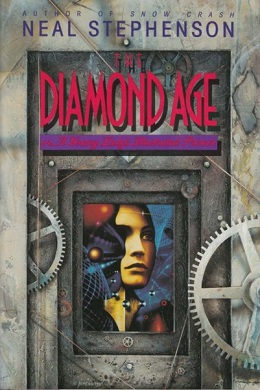★★★★
As I observe my neighbors across the street yelling at their kids as they are often wont to do, I think about Nell and her primer. I'm also thinking about the Mouse Army and whether they ended up better or worse off than the boys born into their families. They didn't have families, but they had each other.
Patrick and I are having an ongoing discussion about what men and women (generalizations, heyo!) look for in media. Someone posited that women look for a story, words they can sing along to, characters they like. We're narrative. Men look for a mood, an experience, a feeling, a setting.
I didn't immediately agree or disagree with him, but I've been gathering information and observations and I keep revisiting the conversation, both mentally and with him. It's made me wonder how we would perceive this story differently. The technology is a huge part of it - it's at the center of the story - the fate of nations and the entire economy is built on the way the technology works and what it makes possible and impossible.
And yet, what I found most compelling was the story of Nell, how she was "raised" by the book and by Miranda, how the other two girls with books were also raised, and how that ultimately affected who they became. The books were originally conceived of to make the girls interesting, not make them loved. Ultimately Neal seems to say that technology can't take the place of people. What does that mean for a male / female dichotomy in which women value emotional connection more than men? What does it mean in the book that the primer was for young ladies and not young men. Could a book have had such an effect on boys, or did it only work because the girls were looking for connection in the first place?

Comments